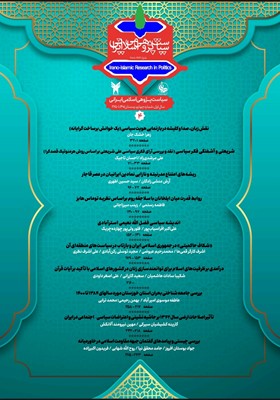بررسی جامعه شناختی بحران استان خوزستان مورد سالهای 1384 تا 1400
محورهای موضوعی : تحولات سیاسی در ایرانعاطفه موسوی امیر آباد 1 * , بهمن رحیمی 2 , محمد ترابی 3
1 - دانشجوی دکتری ،گروه جامعه شناسی سیاسی، واحد قم، دانشگاه آزاد اسلامی، قم، ایران
2 - گروه امنیت ملی ، دانشگاه عالی دفاع ملی، تهران، ایران
3 - استادیار گروه علوم سیاسی، واحد قم، دانشگاه آزاد اسلامی، قم، ایران
کلید واژه: خوزستان, امنیت, بحران, راهبرد,
چکیده مقاله :
چکیدهاستان خوزستان از سال 1384 با یک جریان تازه برخاسته فرهنگی، امنیتی، سیاسی، اقتصادی، زیست محیطی مواجه گردید. در این مقاله تلاش شد، مهم ترین عوامل بحران خوزستان مورد بررسی قرار گیرد.محققین با رویکرد آمیخته، ضمن بهره گیری از اسنادو نظر 5 تن از خبرگان عوامل بحران را احصاء و بعد از تدوین و توزیع پرسش نامه نقاط قوت، ضعف ، فرصت و تهدید را احصاء و براساس آن راهبردهای مقابله ای ارائه نمودند. ترویج و صیانت از گفتمان فرهنگی، کارآمدسازی نظام اقتصادی، سیاسی و زیست محیطی و مقابله با گروههای تروریست بهعنوان راهبرد، همگرایی قومی و مذهبی و مدیریت آب بهعنوان راهکار، همافزایی دستگاههای مسئول، انسجام و همبستگی اقوام، اختصاص درصدی از فروش نفت، رصد جریان ضد امنیتی بهعنوان شاخصهای ارزیابی و میزان وابستگی به مذهب شیعه، میزان بکار گیری نیروهای استان، کاهش اقدامات تروریستی بهعنوان شاخصهای عملکردی احصاء گردید.جنس بحران خوزستان ، از جنس ترکیبی است. موضوعی که بازیگران موثر و ذی مدخل با طراحی ترکیبی فارغ از اقدامات سخت، تمرکز خود را بر اقدامات نرم گذاشته اند، مساله ای که نیازمند برنامه ریزی کوتاه مدت، میان مدت و بلند مدت برای محدودیت و در نهایت توقف آن است. حل نمودن بسیاری از عوامل موصوف یا کم کردن آثار و تبعات آن در کنار مرتفع نمودن مشکلات اقتصادی، باعث کاهش اقدامات سخت و در نهایت کاهش پدیده تغییرات مذهبی میگردد.
abstractKhuzestan province faced a new cultural, security, political, economic, and environmental trend since 2004. In this article, an attempt was made to examine the most important factors of the Khuzestan crisis.With a mixed approach, the researchers, while using the opinion documents of 5 experts, counted the factors of the crisis and after compiling and distributing the questionnaire, they counted the strengths, weaknesses, opportunities and threats and based on that, they presented coping strategies.Promoting and protecting the cultural discourse, making the economic, political and environmental system more efficient and confronting terrorist groups as a strategy, ethnic and religious convergence and water management as a solution, synergy of responsible institutions, cohesion and solidarity of ethnic groups, allocating a percentage of oil sales, monitoring the flow Anti-security as evaluation indicators and the degree of dependence on the Shiite religion, the amount of use of the provincial forces, and the reduction of terrorist acts were calculated as performance indicators.The nature of Khuzestan crisis is of a mixed nature. An issue that the effective and relevant actors have focused on soft measures with a combined design without hard measures, an issue that requires short-, medium- and long-term planning to limit and eventually stop it. Solving many of the described factors or reducing their effects and consequences, along with solving economic problems, will reduce harsh measures and ultimately reduce the phenomenon of religious changes.
_||_

